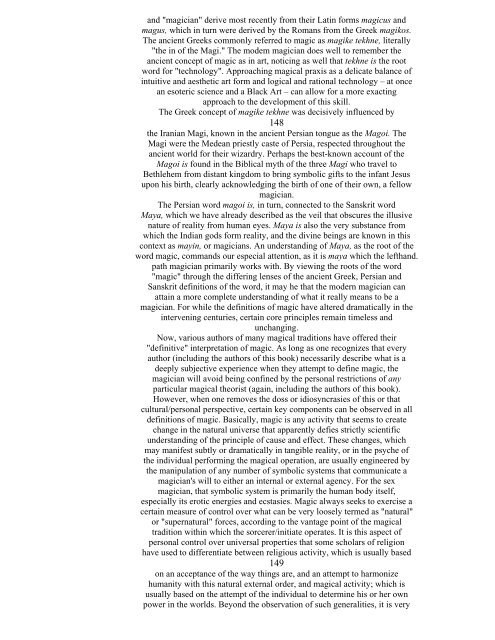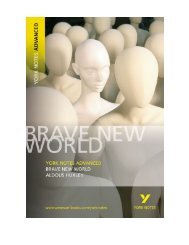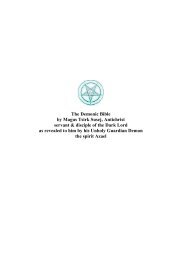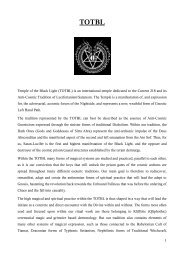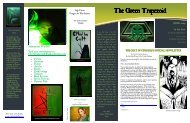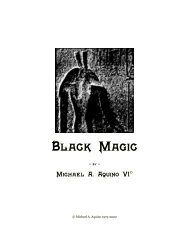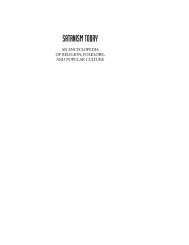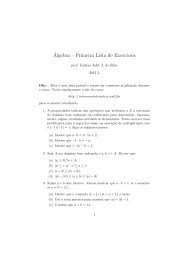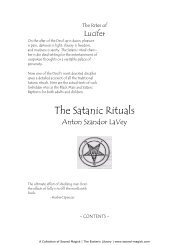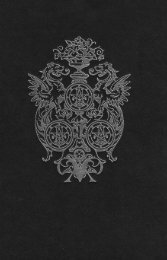I. VAMA MARGA Foundations Of The Left-Hand Path - staticfly.net
I. VAMA MARGA Foundations Of The Left-Hand Path - staticfly.net
I. VAMA MARGA Foundations Of The Left-Hand Path - staticfly.net
You also want an ePaper? Increase the reach of your titles
YUMPU automatically turns print PDFs into web optimized ePapers that Google loves.
and "magician" derive most recently from their Latin forms magicus and<br />
magus, which in turn were derived by the Romans from the Greek magikos.<br />
<strong>The</strong> ancient Greeks commonly referred to magic as magike tekhne, literally<br />
"the in of the Magi." <strong>The</strong> modem magician does well to remember the<br />
ancient concept of magic as in art, noticing as well that tekhne is the root<br />
word for "technology". Approaching magical praxis as a delicate balance of<br />
intuitive and aesthetic art form and logical and rational technology – at once<br />
an esoteric science and a Black Art – can allow for a more exacting<br />
approach to the development of this skill.<br />
<strong>The</strong> Greek concept of magike tekhne was decisively influenced by<br />
148<br />
the Iranian Magi, known in the ancient Persian tongue as the Magoi. <strong>The</strong><br />
Magi were the Medean priestly caste of Persia, respected throughout the<br />
ancient world for their wizardry. Perhaps the best-known account of the<br />
Magoi is found in the Biblical myth of the three Magi who travel to<br />
Bethlehem from distant kingdom to bring symbolic gifts to the infant Jesus<br />
upon his birth, clearly acknowledging the birth of one of their own, a fellow<br />
magician.<br />
<strong>The</strong> Persian word magoi is, in turn, connected to the Sanskrit word<br />
Maya, which we have already described as the veil that obscures the illusive<br />
nature of reality from human eyes. Maya is also the very substance from<br />
which the Indian gods form reality, and the divine beings are known in this<br />
context as mayin, or magicians. An understanding of Maya, as the root of the<br />
word magic, commands our especial attention, as it is maya which the lefthand.<br />
path magician primarily works with. By viewing the roots of the word<br />
"magic" through the differing lenses of the ancient Greek, Persian and<br />
Sanskrit definitions of the word, it may he that the modern magician can<br />
attain a more complete understanding of what it really means to be a<br />
magician. For while the definitions of magic have altered dramatically in the<br />
intervening centuries, certain core principles remain timeless and<br />
unchanging.<br />
Now, various authors of many magical traditions have offered their<br />
"definitive" interpretation of magic. As long as one recognizes that every<br />
author (including the authors of this book) necessarily describe what is a<br />
deeply subjective experience when they attempt to define magic, the<br />
magician will avoid being confined by the personal restrictions of any<br />
particular magical theorist (again, including the authors of this book).<br />
However, when one removes the doss or idiosyncrasies of this or that<br />
cultural/personal perspective, certain key components can be observed in all<br />
definitions of magic. Basically, magic is any activity that seems to create<br />
change in the natural universe that apparently defies strictly scientific<br />
understanding of the principle of cause and effect. <strong>The</strong>se changes, which<br />
may manifest subtly or dramatically in tangible reality, or in the psyche of<br />
the individual performing the magical operation, are usually engineered by<br />
the manipulation of any number of symbolic systems that communicate a<br />
magician's will to either an internal or external agency. For the sex<br />
magician, that symbolic system is primarily the human body itself,<br />
especially its erotic energies and ecstasies. Magic always seeks to exercise a<br />
certain measure of control over what can be very loosely termed as "natural"<br />
or "supernatural" forces, according to the vantage point of the magical<br />
tradition within which the sorcerer/initiate operates. It is this aspect of<br />
personal control over universal properties that some scholars of religion<br />
have used to differentiate between religious activity, which is usually based<br />
149<br />
on an acceptance of the way things are, and an attempt to harmonize<br />
humanity with this natural external order, and magical activity; which is<br />
usually based on the attempt of the individual to determine his or her own<br />
power in the worlds. Beyond the observation of such generalities, it is very


